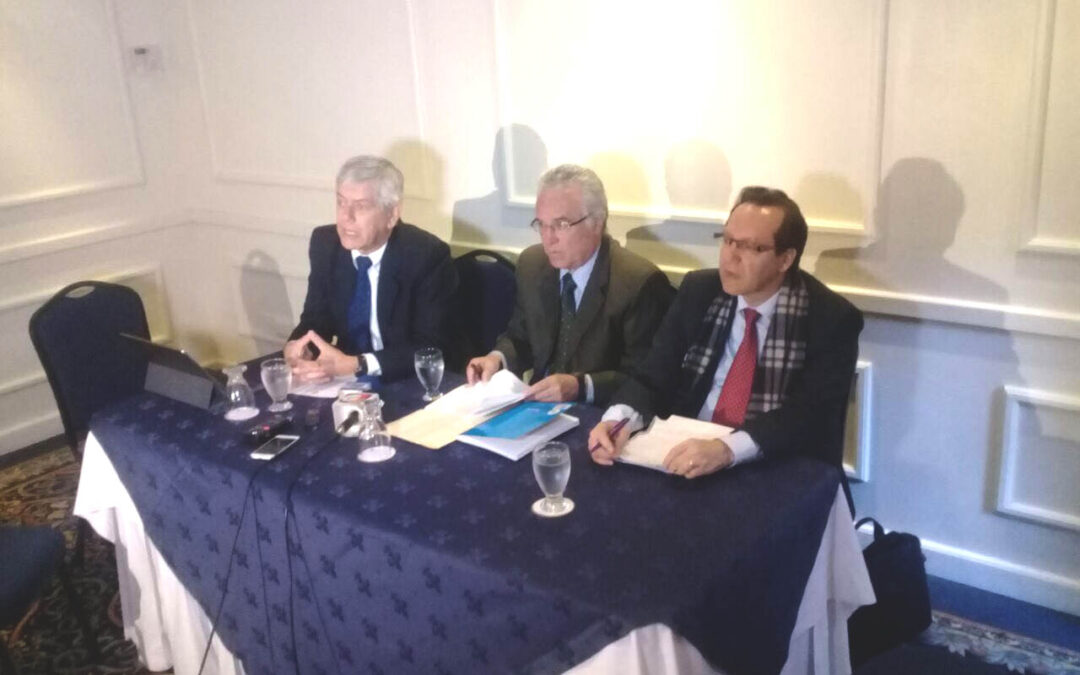
Nov 21, 2017 | Artículos, Noticias
El Comisionado de la CIJ Belisario Dos Santos y el ex magistrado de la Corte Constitucional de Colombia Jaime Araujo visitaron el país, con el objeto de presentar las principales conclusiones del Informe de la CIJ sobre los desafíos que abogado-a-s enfrentan.
Los dos abogados, acompañados del Director de la CIJ para Centroamérica Ramón Cadena (foto de la primera misión), pudieron entrevistarse con el Presidente del Colegio de Abogados, con el Presidente del Tribunal de Honor de dicho colegio, con el Procurador de Derechos Humanos y con el diputado Leocadio Juracán, Sub Jefe de la Bancada Convergencia del Congreso de la República y miembro de la Comisión de Derechos Humanos.
La CIJ agradece la apertura de dichos representantes de los órganos máximos del Colegio de Abogados y Notarios de Guatemala, así como la del Procurador de Derechos Humanos y la del diputado del Congreso de la República.
Dichas conversaciones enriquecieron aún más, los puntos críticos que se presentan a continuación.
La CIJ, en sus actividades relativas a su mandato, se encarga de velar porque el Derecho Interno se adecúe y respete las normas y principios del Derecho Internacional de los Derechos Humanos.
En otras palabras, en el caso de Guatemala, la CIJ lleva a cabo actividades para supervisar que el Estado cumpla con respetar los estándares internacionales en materia de derechos humanos.
La Carta de Naciones Unidas, constituye la base del estado de derecho en el plano internacional.
Además están todas la convenciones y tratados, declaraciones y principios que la Comunidad Internacional ha aprobado, desde que se conformó la Organización de las Naciones Unidas.
Guatemala-Segunda Misión Beli-News-web stories-2017-SPA (texto completo, en PDF)
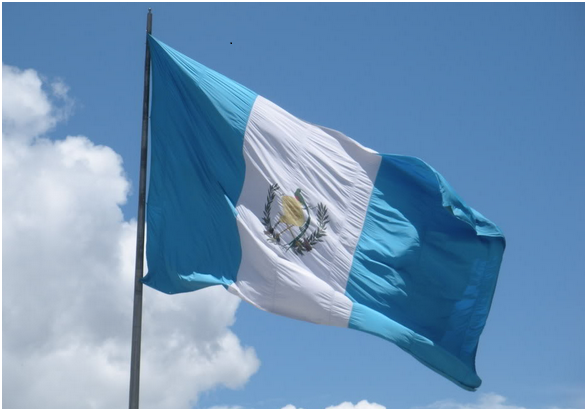
Nov 16, 2017 | Artículos, Noticias
Communicado de la CIJ, ante la visita de Alto Comisionado de las Naciones Unidas para los Derechos Humanos Sr. Zeid Ra´ad Al Hussein a Guatemala.
La CIJ expresó:
1. El país se encuentra en una de las más graves crisis institucionales que se han presentado en la época post-conflicto armado interno. Desde el 27 de agosto, cuando el Presidente de la República declaró persona non grata al Comisionado de la Comisión Internacional contra la Impunidad (CICIG), quedó evidenciado que el Organismo Ejecutivo, al más alto nivel, iniciaba una serie de actos arbitrarios, para afectar el desenvolvimiento de este organismo de las Naciones Unidas.
2. Por su parte, el Congreso de la República, inició la implementación de una “Agenda Legislativa a favor de la Impunidad”, por medio de la aprobación de una ley de reformas al Código Penal, que luego, ante el rechazo generalizado de la población guatemalteca, tuvo que dar marcha atrás.
3. En las últimas semanas, el Congreso de la República, en forma abierta, ha evidenciado que la “Agenda Legislativa a favor de la Impunidad” tiene como pilares fundamentales: a) Facilitar la corrupción por medio de iniciativas tales como eliminar la constancia de “finiquito” o constancia de haber cumplido con todas las normas relativas a la transparencia, para quienes quieran optar al cargo público de diputado o diputada; b) Consagrar la Impunidad en casos de Justicia Transicional a favor de militares acusados de graves violaciones a los derechos humanos cometidas durante el conflicto armado interno, por medio del otorgamiento de una “amnistía general”, y reformas a la Ley de Reconciliación Nacional; c) Reprimir a quienes ejercen el derecho a la resistencia pacífica, así como afectar el normal funcionamiento de las Organizaciones No Gubernamentales, por medio de leyes, que permitirán establecer mayores controles al funcionamiento de las ONGs y desarrollar aún más, la persecución a dirigentes comunitarios, por medio de la Ley contra actos terroristas.
4. Mientras tanto, las y los jueces independientes y honestos del Poder Judicial, continúan sufriendo campañas de difamación, recusaciones infundadas para ser apartados de los casos de alto impacto que conocen; litigio de mala fe por parte de abogados y abogadas que defienden a funcionarios públicos en casos de corrupción que se ventilan en su contra; ataques por medio de medidas disciplinarias y hasta ataques fìsicos.
5. La CIJ ha podido constatar que el Sistema de Justicia tiene grandes retos que debe superar; sin embargo, para ello es necesario que se impulsen reformas que lo fortalezcan. Esas reformas se vuelven casi imposibles, cuando están en manos de funcionarios acusados de cometer delitos o actos de corrupción. Un claro ejemplo, lo constituye la figura jurídica del antejuicio, que según las reformas constitucionales debería desaparecer para el caso de muchos funcionarios públicos. Sin embargo, precisamente fue el Congreso de la República, quien rechazó esta reforma en forma tajante.
6. El próximo año 2018 se iniciará con la crucial elección de Fiscal General. Como lo expresara la CIJ en su comunicado del mes de febrero del presente año, la existencia de un pacto de impunidad, hacía prever acciones concretas en contra de la CICIG y su representante en el futuro inmediato.
7. LA CIJ considera que si en dicha elección el crimen organizado toma el control de esta institución, significará que las estructuras criminales habrán consolidado el Pacto de Impunidad que pretenden implementar, para lograr que los casos de alto impacto que hoy se ventilan ante los tribunales de justicia, se vean seriamente afectados, incluso con la liberación de las personas que se encuentran guardando prisión.
8. En lo que respecta a la obligación del Estado de Guatemala de respetar los derechos humanos de las personas, la CIJ considera que la visita del señor Al Hussein se lleva a cabo en un clima de inseguridad y ataques contra defensores y defensoras de derechos humanos, contra los Pueblos Indígenas y campesinos pobres de Guatemala, imperando acciones estatales de racismo, exclusión y discriminación.
Ante esta crisis institucional, que afecta a los tres organismos del Estado y a la sociedad guatemalteca en su conjunto, Ramón Cadena, Director de la Comisión Internacional de Juristas para Centroamérica expresó:
“La oficina del Alto Comisionado de las Naciones Unidas para los Derechos Humanos (OACNUDH), debe asumir en esta visita, la posición más contundente posible, para obtener de las autoridades del Estado de Guatemala, compromisos concretos, viables y verificables, para construir un verdadero Estado de Derecho, en el que se respeten los derechos humanos de todos los pueblos.”
Guatemala, 16 de noviembre de 2017
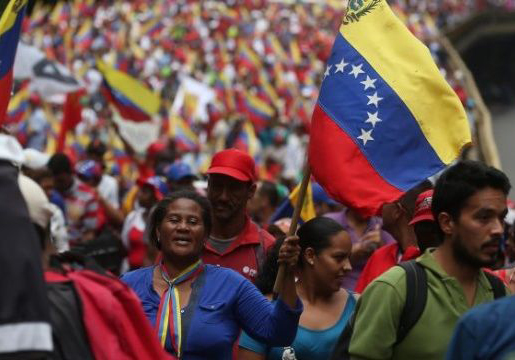
Oct 5, 2017 | News
The ICJ calls for Venezuela to accept long-standing requests for country visits by UN Special Procedures whose mandates are most relevant to the rule of law and human rights crisis in the country.
The ICJ takes note of the announcement by the Venezuelan Government that it is inviting the UN Independent Expert on the promotion of a democratic and equitable international order, Mr. Alfred de Zayas, to visit the country.
This announcement, together with a recent invitation to the Special Rapporteur on the right to development is significant. For more than a decade, the Venezuelan Government has denied or left unanswered requests for visits to the country by numerous other of the independent experts (known as “Special Procedures”) of the United Nations. The last mission to Venezuela by a special procedure was the Special Rapporteur on Torture in 1996.
However, the breakdown of the rule of law and the extremely serious human rights situation in Venezuela make visits by other United Nations Special Procedures of urgent relevance.
“In the course of this year, extrajudicial and arbitrary executions, torture and ill-treatment of detainees, arbitrary detention, trial of civilians by military tribunals, and persecutions and attacks against opponents, dissidents and human rights defenders have become systematic and generalized practices in Venezuela, said Federico Andreu Guzman, ICJ South America Representative.
“It is therefore difficult to see why the Government of Venezuela would not respond to long-standing requests from Special Procedure mandates relevant to these violations in favour of proactively inviting other UN experts”, Andreu Guzman added.
The ICJ therefore calls on the Government of Venezuela to invite to visit the country the Working Group on Arbitrary Detention and the Special Rapporteurs on extrajudicial, summary or arbitrary executions; the independence of judges and lawyers; torture and other cruel, inhuman or degrading treatment or punishment; the rights to freedom of peaceful assembly and association; the promotion and protection of the right to freedom of opinion and expression; and on the situation of human rights defenders. All of these UN experts have long-standing requests to visit Venezuela, some for many years, which the Venezuelan Government has failed so far to accept.
“Under the Charter of the United Nations, Member States have the obligation to cooperate with the UN Special Procedures on human rights. This duty is of particular importance when the State is a member of the Human Rights Council, as is the case with Venezuela”, said Andreu Guzman.
The ICJ also calls on the Government of Venezuela to accept the request for a visit to the country that, since 2004, has been repeatedly issued by the Inter-American Commission on Human Rights.
Background
For several years, the following Special Procedures of the UN Human Rights Council have made requests to visit Venezuela: the Special Rapporteur on extrajudicial, summary or arbitrary executions; the Special Rapporteur on the situation of human rights defenders; the Working Group on Arbitrary Detention; the Special Rapporteur on the independence of judges and lawyers; the Special Rapporteur on the rights to freedom of peaceful assembly and association; the Special Rapporteur on violence against women, its causes and consequences; the Special Rapporteur on torture and other cruel, inhuman or degrading punishment; the Special Rapporteur on the promotion and protection of the right to freedom of opinion and expression; the Working Group on the issue of human rights and transnational corporations and other business enterprises; the Special Rapporteur on adequate housing as a component of the right to an adequate standard of living; and the Special Rapporteur on the right to food.
At the regional level, although it denounced the American Convention on Human Rights in September 2012, Venezuela is still a State party to three Inter-American human rights treaties (Inter-American Convention to Prevent and Punish Torture; Inter-American Convention on Forced Disappearance of Persons; and Inter-American Convention on the Prevention, Punishment and Eradication of Violence Against Women). However, Venezuela has systematically ignored recommendations of the Inter-American Commission on Human Rights (IACHR) and has also denied IACHR requests to visit the country, made since 2004.
Contacts
Federico Andreu-Guzmán, ICJ South America Representative, tel: +57 311 481 8094; email: federico.andreu(a)icj.org
Carlos Ayala Corao, ICJ Commissioner (Venezuela), tel: +57 414 243 4872; email: cayala(a)cjlegal.net
Alex Conte, ICJ Global Redress and Accountability Initiative, tel: +22 979 3802; email: alex.conte(a)icj.org
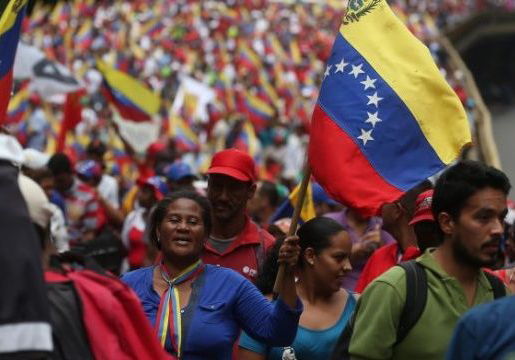
Oct 5, 2017 | Comunicados de prensa
La CIJ hace un llamado a Venezuela a que acepte las solicitudes de visitas al país que han formulado, desde hace varios años, los Procedimientos especiales de las Naciones Unidas, cuyos mandatos son más relevantes para el Estado de Derecho y la crisis de derechos humanos.
La CIJ toma nota del anuncio del Gobierno de Venezuela de invitar al país al Experto independiente sobre la promoción de un orden internacional democrático y equitativo de las Naciones Unidas, Sr. Alfred de Zayas.
Este anuncio, así como él de invitar al país al Relator Especial sobre el derecho al desarrollo, resulta significativo. Por más de una década, el Gobierno venezolano ha denegado o dejado sin respuesta las solicitudes de visita al país de numerosos Expertos de las Naciones Unidas (conocidos como “Procedimientos especiales”). La última misión realizada a Venezuela por un Procedimiento especial, fue la del Relator Especial sobre la Tortura en 1996.
Sin embargo, dada la ruptura del Estado de Derecho y la gravísima situación de derechos humanos en Venezuela, se requiere urgentemente que otros Procedimientos especiales de Naciones Unidas, con un mandato relevante, realicen misiones en el país.
“En el curso de este año las ejecuciones extrajudiciales y arbitrarias, la tortura y malos tratos a detenidos, la detención arbitraria, el juzgamiento de civiles por tribunales militares y las persecuciones y ataques contra opositores, disidentes y defensores de derechos humanos se han convertido en prácticas sistemáticas y generalizadas en Venezuela”, declaró Federico Andreu-Guzmán, Representante para Suramérica de la CIJ.
“Por lo tanto, es difícil entender por qué el Gobierno de Venezuela no responde a las solicitudes formuladas desde larga data por los Procedimientos especiales con mandatos sobre estas violaciones, mientras invita de forma proactiva a otros Expertos de las Naciones Unidas”, agregó Andreu-Guzmán.
La CIJ hace, por lo tanto, un llamado al Gobierno de Venezuela a que invite a visitar el país al Grupo de Trabajo sobre la Detención Arbitraria y a los Relatores Especiales sobre ejecuciones extrajudiciales, sumarias o arbitrarias; la independencia de los magistrados y abogados; la tortura y otros tratos o penas crueles, inhumanos o degradantes; los derechos a la libertad de reunión pacífica y de asociación; la promoción y protección del derecho a la libertad de opinión y de expresión; y sobre la situación de los defensores de derechos humanos. Todos estos Expertos de las Naciones Unidas han solicitado visitar Venezuela desde tiempo atrás, incluso algunos desde hace varios años, sin que el Gobierno venezolano haya aceptado estas solicitudes hasta ahora.
“Los Estados miembros de las Naciones Unidas tienen, bajo la Carta de las Naciones Unidas, la obligación de cooperar con los Procedimientos especiales de derechos humanos de esta organización. Esta obligación cobra particular importancia cuando el Estado es miembro del Consejo de Derechos Humanos, como es el caso de Venezuela”, declaró Andreu-Guzmán.
Asimismo, la CIJ hace un llamado al Gobierno de Venezuela para que acepte la solicitud de visita al país que, desde el año 2004, ha reiterativamente formulado la Comisión Interamericana de Derechos Humanos.
Información complementaria
Desde hace varios años, los siguientes Procedimientos especiales del Consejo de Derechos Humanos de las Naciones Unidas han solicitado visitar a Venezuela: el Relator Especial sobre ejecuciones extrajudiciales, sumarias o arbitrarias; el Relator Especial sobre la situación de los defensores de derechos humanos; el Grupo de Trabajo sobre la Detención Arbitraria; el Relator Especial sobre la independencia de los magistrados y abogados; la Relatora Especial sobre los derechos a la libertad de reunión pacífica y de asociación; la Relatora Especial sobre la violencia contra la mujer, sus causas y consecuencias; el Relator Especial sobre la tortura y otros tratos o penas crueles, inhumanos o degradantes; el Relator Especial sobre la promoción y protección del derecho a la libertad de opinión y de expresión; el Grupo de Trabajo sobre la cuestión de los derechos humanos y las empresas transnacionales y otras empresas; la Relatora Especial sobre una vivienda adecuada como elemento integrante del derecho a un nivel de vida adecuado; y la Relatora Especial sobre el derecho a la alimentación.
En el ámbito regional, aunque denunció la Convención Americana sobre Derechos Humanos en septiembre de 2012, Venezuela sigue siendo Estado parte de tres tratados interamericanos de derechos humanos (La Convención Interamericana para Prevenir y Sancionar la Tortura; la Convención Interamericana sobre Desaparición Forzada de Personas; y la Convención Interamericana para Prevenir, Sancionar y Erradicar la Violencia Contra la Mujer). Sin embargo, las recomendaciones de la Comisión Interamericana de Derechos Humanos han sido sistemáticamente ignoradas por el Estado venezolano, el cual además ha denegado las solicitudes de visita al país que este órgano ha formulado desde el año 2004.
Contactos
Federico Andreu-Guzmán, Representante para Suramérica de la CIJ, tel: +57 311 481 8094; correo electrónico federico.andreu@icj.org
Carlos Ayala Corao, Comisionado de la CIJ (Venezuela), tel: +57 414 243 4872; correo electrónico cayala@cjlegal.net
Alex Conte, Iniciativa Global de la CIJ sobre Reparación y Rendición de Cuentas, tel: +22 979 3802; email: alex.conte@icj.org
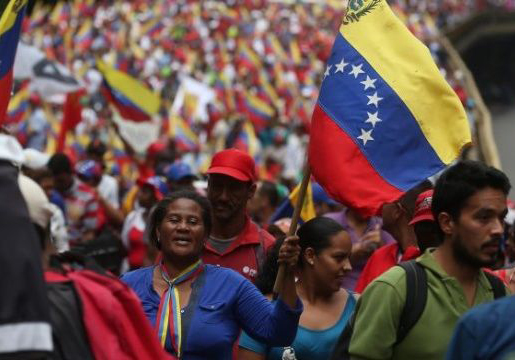
Sep 28, 2017 | Advocacy, Uncategorized
The ICJ today called on the UN Human Rights Committee and a group of UN Special Procedure mandates to take urgent follow up action on Venezuela in light of the grave and ever deteriorating human rights situation in the country.
In a letter to the UN Human Rights Committee, the treaty body responsible for monitoring implementation by States parties to the International Covenant on Civil and Political Rights (ICCPR), the ICJ called for urgent action by the Committee, either through its established follow-up procedure and/or through requesting a special interim report. The Committee’s follow-up procedure was referenced in the Committee’s Concluding Observations on Venezuela’s fourth periodic report under the ICCPR. Special interim reports may be requested by the Committee under Article 40(1)(b) of the ICCPR.
The ICJ also called for urgent action to be taken by the following UN Special Procedure mandates: the Working Group on Arbitrary Detention, the Special Rapporteur on freedom of opinion and expression, the Special Rapporteur on freedom of assembly and of association, the Special Rapporteur on the independence of judges and lawyers and the Special Rapporteur on torture and other cruel, inhuman or degrading treatment. This group of Special Procedure mandates had on 4 August 2017 issued a joint statement on the human rights situation in Venezuela.
The ICJ’s letters draw attention to several critical areas of concern:
- The rapidly deteriorating human rights situation;
- The lack of accountability of perpetrators of human rights violations;
- The lack of effective remedies and reparation for victims of human rights violations;
- The lack of independence of the judiciary;
- The institutional crisis arising from decisions of the Supreme Court of Justice;
- The unconstitutional election of the new National Constituent Assembly;
- The dismissal of the former Attorney General;
- The recent establishment of a ‘Truth Commission’;
- The intended revision of Venezuela’s Constitution; and
- Venezuela’s failure to notify its state of emergency under the ICCPR.
ICJ-Correspondence-VenezuelaFollowUp-HRCttee-2017-09-28 (download letter to the Human Rights Committee, in PDF)
ICJ-Correspondence-VenezuelaFollowUp-SPs-2017-09-28 (download letter to the Special Procedure mandates, in PDF)
ICJ reports:
Venezuela: the Supreme Court of Justice has become an arm of an authoritarian executive
Venezuela: rule of law and impunity crisis deepens
Venezuela: dismissal of Attorney General a further blow to the rule of law and accountability
Venezuela: Human rights and Rule of Law in deep crisis
Strengthening the Rule of Law in Venezuela









